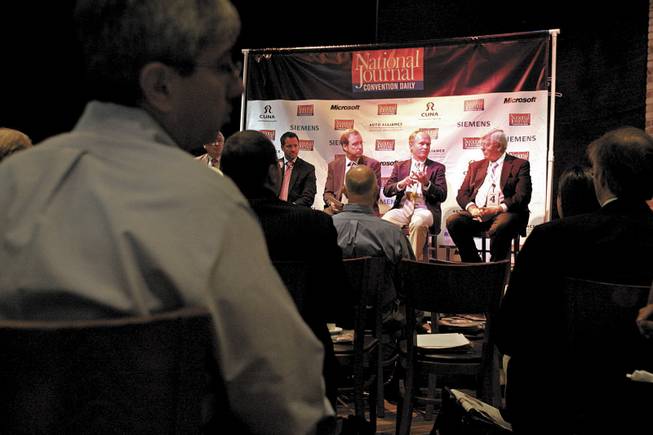
Panelists, from left, Chuck Donovan, William Miller, John Fox, Charles Bass and David Keene discuss the future of the Republican Party at a forum Monday in conjunction with the party’s convention. Bass leads Republican Main Street Coalition, a group that seeks party moderation on social and environmental issues.
Tuesday, Sept. 2, 2008 | 2:01 a.m.
The Republican National Convention here is as much about the far-off future as it is about the November election.
Sun Expanded Coverage
Here’s why: Although the party’s nominee, Arizona Sen. John McCain, has a strong shot at winning this fall, his age and health history — he’s had cancer — make him more likely to serve one term than any recent president.
Moreover, although he has a conservative voting record, he’s never been associated with any dominant strand of conservative ideology.
As a result, the party’s ideological factions — libertarians and social conservatives and even resurgent moderates — are seeking out, sometimes in conflict, a new ideological framework to solve new problems. It’s the most introspective the party has been in years, maybe decades.
This discussion has played out this year in Nevada in the form of a sometimes bitter feud, with libertarian supporters of Rep. Ron Paul all but taking control of the state party’s spring convention before party leadership shuttered it. The Nevada delegation to the convention here is an uneasy mix of party regulars and a handful of hardened Paul-ites.
At forums comprising think tank intellectuals and conservative journalists, elected officials and lobbyists, Republicans here are open about the need for the party to change.
“We’ve seen a catastrophic erosion of the Republican Party since the mid-’90s,” said David Frum, a former speech writer for President George W. Bush who is a resident fellow at the American Enterprise Institute.
Others were less pessimistic, but acknowledged a need to retool.
“We’re entering a new era of conservatism and we need to determine where we are and where we’re going,” said Vin Weber, a respected former congressman who is a senior fellow at the Humphrey Institute.
The reasons are clear: Republicans have been cutting taxes for decades, but middle income Americans are feeling economically insecure, while big problems such as energy independence and exploding health care costs elude cookie-cutter conservative answers. Once seen as the party of competent management, the Republican brand has been badly eroded by perceived incompetence during the first four years of the Iraq war and the initial response to Hurricane Katrina (hence, the extreme attention paid Monday to Hurricane Gustav.)
Another key problem, Weber said, is that the party had become confined to the South, with almost no presence in the most populous parts of the country.
That’s where Charlie Bass steps in. The former New Hampshire congressman heads up the Republican Main Street Coalition, a centrist group that calls for moderation on social and environmental issues. His group was a party pariah until 2006, when Republicans lost their majority in large part because it could not hold on to moderate suburban districts around big cities.
Of McCain, Bass said: “He’s a reformer, he’s bipartisan and he can produce solutions.”
What solutions though, and to what problems?
Conservative intellectuals are trying to figure that out.
Ross Douthat, a senior editor at The Atlantic and co-author of “Grand New Party,” credited the Republican Party for properly addressing the problems of the modern welfare state in the 1970s and 1980s, including high taxes, crime and welfare abuse, and winning over the white working class in the process. However, those problems “have dried up,” he said.
The new issues, he said, include globalization, family breakdown and socioeconomic immobility.
The Republican Party needs an agenda for Wal-Mart America, Douthat said.
He suggested a program subsidizing wages and using the tax code to encourage family stability.
Frum, who recently wrote “Comeback: Conservatism That Can Win Again,” credited former President Clinton with sound economic stewardship that improved the public image of Democrats on a key issue.
Republicans must respond, he said, with a greater emphasis on environmentalism, a softer line on social issues and a more intense interest in health care.
Also, he said, Republicans have become dangerously flippant about effective government and managing it well. “Americans live in a country in which things work. The package gets there overnight,” he said.
Voters have begun to reject Republicans, he said, because they have no faith in their ability to run government well.
What’s the commonality? Skeptical conservatives might call it creeping centrism.

Join the Discussion:
Check this out for a full explanation of our conversion to the LiveFyre commenting system and instructions on how to sign up for an account.
Full comments policy